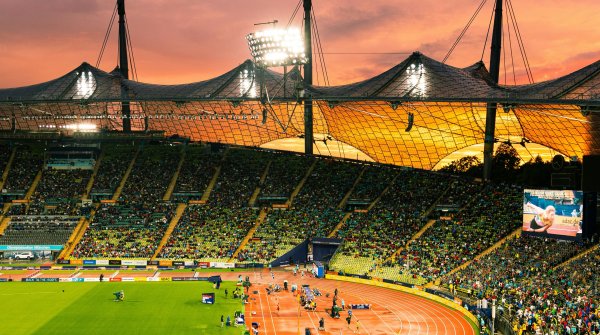Major sporting events hold an incomparable power in society. They trigger unbelievable euphoria as nations celebrate and unite, and for a short time, the world seems to stand still, and people forget their worries, fears and hardships. Crowds gather to experience goosebumps while watching the best in the world compete, experiencing golden moments for that will be iconic for all eternity. Anyone who has ever been lucky enough to have been to a major sporting event can understand this, bringing us to the importance and impact of the Olympics.
The biggest sporting event on the planet is the Summer Olympics, so it’s understandable that a huge focus falls on sustainability. From July 26 to August 11, 2024, a total of around 10 500 athletes are competing in Paris, with 9.7 million out of the 10 million tickets available for 329 decisions already having been sold. For comparison: 100 years ago, the Games also took place in the French capital. Back then, "only" just under 3,000 athletes took part in 126 competitions. Around 100 journalists reported on the Games back then, but for the 2024 Olympics, this number is a whopping 1300. All eyes are on the Olympics, and especially the sustainability of this global event.
The challenges at today's events are huge. The IOC (International Olympic Committee), as the organizer of the 33rd Summer Olympics, has set ambitious goals for itself. They are standing for equality and want the Games to be as inclusive as possible, as well as setting new standards in terms of sustainability. Gone are the days when organizers plough through metropolises for sporting events, making them blossom in the short term and then leaving only barren and destroyed hectares behind in the end. The world’s eyes are growing increasingly more on sustainability and the effect huge events like the Olympics have on the places they are hosted. That is why the IOC has gone above and beyond to create sustainability for the Olympics that can herald a new era for the beloved Games.
It is therefore fitting that, in Paris, the IOC is coming up against a metropolis of millions that have long since started reclaiming quality of life and stopped putting up with destructive events with no regard for sustainability. The need to reduce the ecological footprint of global events has never been greater, and the awareness surrounding this issue is at an all-time high with the Olympics at hand. In fact, the need is more urgent than ever, so where do the organizers want to fit in and what paths are being taken in terms of sustainability at the Olympics?

If the organizers of Paris Olympics 2024 have their way, CO₂ emissions will be more than halved compared to previous events such as London 2012 (3.4 million tonnes) and Rio de Janeiro 2016 (3.6 million tonnes) to uphold sustainability. During the competition days and through the construction of new Olympic venues and facilities for the athletes, Paris aims to go for sustainability gold and limit its carbon footprint to a maximum of 1.75 million tons. For comparison: Berlin emits around 15 million tons of CO₂ annually.
This emission target includes factors like spectator travel, and Paris has set several steps in motion to ensure this. The sustainability plan includes 95% of the venues and facilities in the Olympics being existing or temporary buildings, and 100% of the venues will be connected to the public electricity network. Other factors being focused on include a 50% reduction in single use plastics for food and beverages, as well as 100% of uneaten food being recycled. Lastly, 90% of the Games’ signage elements will be reused, recycled or redeployed, all in an attempt to make this the most sustainable Olympics yet. However, according to BBC: “80% of a sporting event’s emissions typically come from spectator travel.” Since fans will be travelling from all over the world to spectate this event, this is a hefty goal to reach.
In order to be able to present itself as a climate-neutral and sustainable Olympics in the end, the emissions that cannot be avoided are to be offset by environmentally friendly projects such as reforestation. That is good. But it is also clear that "carbon offsetting will not stop climate change," says climate researcher Roger Pielke. Technical progress and political decisions will. Both are on the agenda for sustainability in Paris Olympics. Nevertheless, it is still a true fact that major sporting events produce large quantities of CO₂.
This concept was already met with applause and acceptance at the 2022 European Championships in Munich. Paris is not quite as exemplary, but a rethink is taking place. The aim is to limit the structural footprint by using 95% existing and temporary infrastructure. After all, the city on the Seine already offers many possibilities and magnificent backdrops. Only the Aquactis Centre (swimming and diving competitions), the Porte de La Chapelle sports arena (badminton and rhythmic gymnastics) and the Olympic Village in the poorest Parisian suburb of Seine-Saint-Denis will be built to boost sustainability. The aquatic center is to be used as an educational facility for children after the Olympics have taken place, while the Olympic Village is to be converted into a lively residential area for long-term sustainability. However, some people doubt that the immediate residents will benefit from this.
"The apartments will mainly be bought by people from outside - residents can't afford apartments for around 7,000 euros per square meter," says Hamid Ouidir, representative of the residents of the Olympic Village in St. Denis. For most families and students, for whom the village is primarily intended, it will be a tough competition. Incidentally, no air conditioning was installed during the construction of the Olympic Village in the name of sustainability, but this certainly left the athletes less happy. In view of a possible heatwave, this may well become an issue during the Games as well.

At the very least, there is a desire to use 100% renewable energy for all the competition venues. The venues are all connected to the electricity network of the city, but the entire Olympics will be powered by renewable energy that was generated on six wind farms and two solar farms in France. The Premium Partner EDF will supply Paris with the same amount of renewable energy as was consumed during the entirety of the games, a world first for sustainability in the Olympics.
However, the question may be asked as to why the surfing competitions are held in Tahiti, the largest island in French Polynesia? Of course, the biggest benefit is that you don't have to build an artificial surf wave, as is currently the case in many places due to the inner-city surfing trend. According to the organizers, Teahupo'o was the most sustainable option, as most of the participants in the surfing competitions come from Oceania or North America and the journey is therefore much shorter than to Central Europe, also adding to the sustainability target of the Olympics.
However, the fact that a new tower for the judges is to replace an existing wooden tower in the middle of a coral reef caused a fierce conflict with environmentalists and residents who felt ignored, putting a dampener on the sustainability trend of the 2024 Olympics. The $5 million or €4.6m three-story-tall, aluminum structure is now standing, and it is fitted with air conditioning, toilets and space for 40 people.
In contrast, the concept in Paris itself seems to be working. All venues will be accessible by public transport, 80% are within a radius of 10 km and less than half an hour from the Olympic Village. A year before the start of the Games, Paris had also begun to abolish parking spaces in the city and turned the space gained into green areas. Paris also introduced new speed limits on the city highway and banned coaches from the city center. New cycle paths have been created. This was a massive attempt towards sustainability by the Olympics, but the city will benefit from this in the long term. The fact that climate-friendly vehicles will be used to transport Olympics officials is a good step in the right sustainability direction, although it was already somewhat expected.

During the Olympics, 13 million meals will be served to athletes, officials, volunteers and spectators. The focus here is on sustainable, low-meat food with local and seasonal products and local partners. The aim is to minimize food waste and waste during the event. It is not possible to do an event like the Olympics completely without single use plastics, but the goal of a 50% reduction is to be achieved by reusing drinking bottles and building drinking water fountains. In another bid for long-term sustainability, the drinking fountains are also set to be used outside the sports venues and beyond the Olympics, so it will help the entire city in the long term.
Paris mayor Anne Hidalgo won the race for the Olympic Games seven years ago with her "Saving the Seine" pledge to clean up the Seine so that people could swim in it again. Cleaning up the water in the Seine was probably the costliest sustainability project of the Olympics, as the river was a cesspool for decades. At the opening ceremony on July 26, which for the first time did not take place in a stadium, there was a boat parade across the Seine, although it wasn’t nearly as bright blue as everyone had hoped. The aim was to show the whole world the sustainability feats that have been achieved in the Paris Olympics. At the same time, they also wanted the city's residents to be able to attend this event. More than 320,000 people attended this ceremony as 94 different boats carried the athletes down the river. Open water swimming and triathlon swimming are planned in the river, and even though there was a lot of speculation about whether it would become a reality, the Seine was tested and found safe by officials just before the events took place. Dozens of natural water swimming pools were also planned for the Olympics. French President Emmanuel Macron is euphoric: "We are about to realize one of the most beautiful legacies of the Olympic and Paralympic Games." It remains to be seen whether Paris will actually reach all these sustainability targets in the Olympics. Everyone is hoping for a Seine that you can still swim in next summer, which will ensure more citizens will fall in love with the city of love. Sustainability is set to be the most lasting benefit of these Olympic Games.
 Sports BusinessThe future of the bike industry: 6 innovative bike stores
Sports BusinessThe future of the bike industry: 6 innovative bike stores
- ISPO awards
- Mountain sports
- Bike
- Design
- Retail
- Fitness
- Health
- ISPO Job Market
- ISPO Munich
- ISPO Shanghai
- Running
- Brands
- Sustainability
- Olympia
- OutDoor
- Promotion
- Sports Business
- ISPO Textrends
- Triathlon
- Water sports
- Winter sports
- eSports
- SportsTech
- OutDoor by ISPO
- Heroes
- Transformation
- Sport Fashion
- Urban Culture
- Challenges of a CEO
- Trade fairs
- Sports
- Find the Balance
- Product reviews
- Newsletter Exclusive Area
- Magazine





